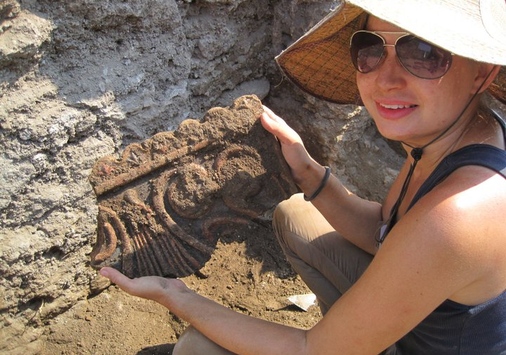Was Cleopatra Greek, Egyptian, Black or White? The modern racial politics of Cleopatra have been uncovered, yet again, by the announcement of a new production on the life of Cleopatra, the famous Egyptian queen, featuring Gal Gadot, an Isreali-born actress. Associate Professor of Classical Studies Rebecca Futo Kennedy has co-authored a series of blog posts investigating the origins of race and identity through the lens of this modern controversy.
She and her co-authors note:
One of the burning questions that always arises, and which was seen in evidence in the US and UK centered social media responses, is the question of the historical Cleopatra’s descent. This is, of course, a complicated question that has been engaged by many, many historians and pop culture enthusiasts. Indeed, most of the ‘first look’ media write-ups of the controversy fell very quickly into the old tropes of situating Gadot as Cleopatra within a longstanding “Was Cleopatra White?” vs. “Was Cleopatra Black?” skin color story, that has been raging since announcements years ago of a potential Angelina Jolie or Lady Gaga fronted version. Beyond this chromatic debate are the arguments over whether Cleopatra was an ‘African’ queen, Egyptian (but not ‘African’), or ‘Greek’ (i.e. Macedonian) queen, as if these are mutually exclusive and genetically unique identities. To debate this, scholars and the general public alike, look to the seemingly unexplainable gaps in Cleopatra’s family tree and retroject modern political identity categories backwards onto her.
The most prominent gaps are found in Cleopatra’s mother’s identity and her grandmother’s. In 2009, a group of BBC presenters/archaeologists proposed, based on analysis of a body claimed to be that of Arsinoe, Cleopatra’s sister, that their mother “had an ‘African’ skeleton.” It has also variously been argued that her paternal grandmother was indigenous Egyptian and so, potentially “Black”. Despite these attempts to understand the anomalies in Cleopatra’s family history, for the most part, when asked, most scholars and students of the Greco-Roman world, will say, without hesitation “Cleopatra VII was white—of Macedonian descent, as were all of the Ptolemy rulers, who lived in Egypt.” They often even dismiss the speculations that she may not be “White” as not credible.
The reality, however, is that “White” and “Black” are not ancient categories of race or ethnicity and “Egyptian”, “Macedonian”, “Greek” and “African” have different modern meanings and invoke different political and social affiliations than they did in antiquity. Even the qualification that Cleopatra was a “Macedonian Greek” echos the contemporary disputes over the use of the name “Macedonia”. Trying to decide into which of these identities Cleopatra fits is like putting a round peg into a square hole. More importantly, when scholars perpetuate the idea that her family tree defines her Greekness, Egyptianness, or Africanness, or even her ‘race’ at all, they perpetuate the idea that the modern racial identities we inhabit are universal across time and place. But Cleopatra does not have a ‘race’ as we understand it and to make any claims to being able to identify the “true racial background” of Cleopatra is to perpetuate a modern political position. She cannot be “at least 50% Egyptian” or “pure Macedonian Greek” because such things are modern socially and politically important and structured forms of identity; race is not a genetic truth. If we take our cue from antiquity itself, the ancient sources on Cleopatra are uninterested in disputing or even discussing her identity in the ways we obsess over.
Before we can talk about who Cleopatra was and who should play her on film or TV, then, we need to first be honest that any casting of Cleopatra is one that conforms to a modern political desire or social fantasy, whether that fantasy is of a White antiquity or a desire for inclusive representation in popular media. From this vantage point, it is much easier to understand why controversy erupts so frequently over Hollywood and television castings. We have competing visions of who Cleopatra is to us. The problem ultimately becomes who is ‘us’?








